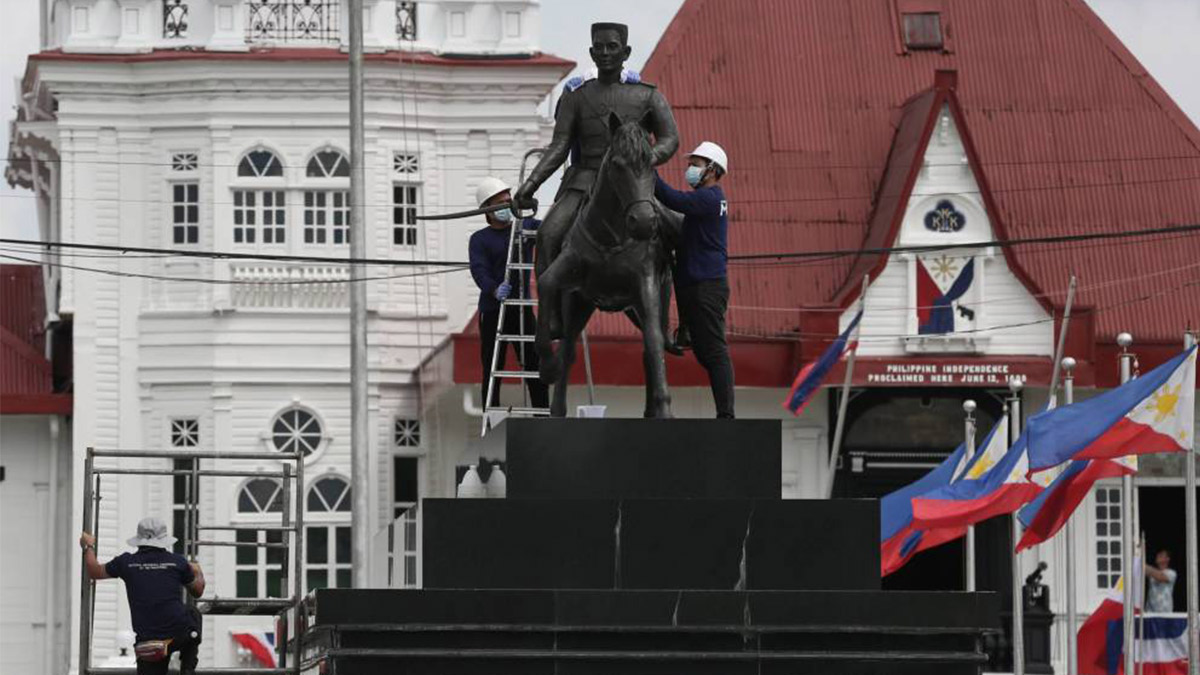
PAST AND PRESENT | Preparations are underway at the Aguinaldo Shrine for the celebration of the country’s 126th Independence Day on Wednesday. President Marcos on Sunday said the struggle for independence continues to uphold “our freedom in our territory and sovereignty.” —Photo by Richard A. Reyes, Philippine Daily Inquirer
MANILA, Philippines—President Ferdinand Marcos Jr. has issued an order to government offices and public schools to include the singing of the “Bagong Pilipinas” (“New Philippines”) hymn and reciting of the pledge during their flag rites “to further instill the principles of the Bagong Pilipinas brand of governance and leadership” among state personnel and employees.
Marcos issued Memorandum Circular (MC) No. 52 on June 4, a copy of which was released to the media on Sunday, directing “all national government agencies and instrumentalities, including GOCCs (government-owned and -controlled corporations) and educational institutions, such as SUCs (state universities and colleges),” and encouraging local government units (LGUs) “to integrate the recital of the Bagong Pilipinas Hymn and Pledge in the conduct of the weekly flag ceremonies, subject to existing laws, rules and regulations.”
The circular, signed by Executive Secretary Lucas Bersamin, takes effect “immediately” and contains a copy of the said hymn and pledge.
READ: Marcos tells Filipinos to continuously ‘fight for freedom, sovereignty’
“For this purpose, the heads of all national government agencies and instrumentalities shall ensure that the Bagong Pilipinas hymn and pledge, which are annexed to this circular, are properly disseminated within their respective institutions and offices,” Bersamin said.
The Presidential Communications Office was asked to implement effective measures to communicate and disseminate the Bagong Pilipinas hymn and pledge to all government agencies and the public.
In his directive, Marcos invoked Republic Act No. 8491, or the Flag and Heraldic Code of the Philippines, which required all government agencies and LGUs to conduct flag-raising rites on Mondays and flag-lowering on Fridays.
The law authorizes the Office of the President to issue rules and guidelines for the proper conduct of the flag ceremonies, the President said.
He also cited his MC 24, which launched his administration’s Bagong Pilipinas brand of governance and leadership and directed all agencies and instrumentalities, GOCCs and SUCs, “to be guided by the Bagong Pilipinas principles.”
“Bagong Pilipinas is characterized by principled, accountable and dependable government, reinforced by unified institutions of society [and] envisioned to empower Filipinos to support and participate in all government efforts in an all-inclusive plan towards deep and fundamental social and economic transformation in all sectors of society and government,” the President said.
Echoes of ‘New Society’
In Congress, Sen JV Ejercito said Malacañang’s order does not seem to be “a very good idea.”
“Lupang Hinirang, Panatang Makabayan and Panunumpa sa Watawat are more than enough to instill nationalism and love for country,” he pointed out.
“Adding a hymn and another pledge will already be too much,” he added.
ANNEXES TO CIRCULAR President Marcos’ Memorandum Circular No. 52, released on June 9, includes the two-page “Bagong Pilipinas” hymn and single-page “Bagong Pilipinas” pledge, which all government agencies are directed to “integrate in the conduct of weekly flag ceremonies.”
House Deputy Minority Leader France Castro on Sunday urged the President to rescind the directive, calling it “self-serving and [a] martial law remnant.”
Castro, the ACT Teachers party list representative, claimed that Mr. Marcos’ MC 52 was an attempt at indoctrinating government workers and the youth on the “Bagong Lipunan” (“New Society”) branding and revisionism of history. “Bagong Lipunan” was the predominant theme of the President’s father and namesake during the martial law regime in the 1970s.
Castro cautioned that the directive could be an attempt at indoctrinating government personnel and young Filipinos on the Marcos administration’s Bagong Pilipinas branding, “reminiscent of the martial law period’s ‘Bagong Lipunan’ propaganda.”
She pointed out in Filipino: “Instead of coming up with these gimmicks, the Marcos administration should be taking this time to think of solutions that would address the citizens’ problems of low workers’ pay and the high cost of goods. They should be helping the drivers and operators who would lose their livelihood and create quality regular jobs in the country.” —with reports from Tina G. Santos and Jeannette I. Andrade